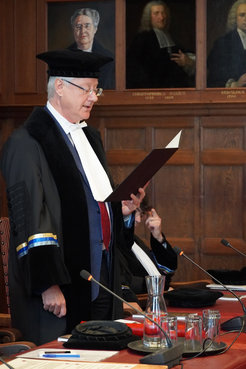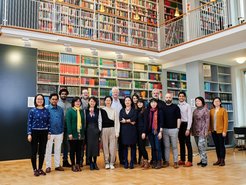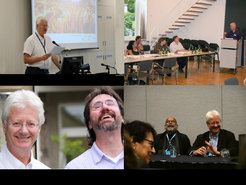Blog | July 2021
Retirement of Peter van der Veer on 31.05.2021[1]
by Jie Kang
After nearly 12 stimulating years, Peter van der Veer retired and the RDD Department in its current form ended. On 31.05. 2021 at 2pm in Goettingen, almost 70 former fellows, PhD students and colleagues from around the globe (including America, India, China, Singapore, France, UK, Philippine, Holland, Vietnam, Hongkong, Taiwan, Korea etc.) gathered on zoom to celebrate the achievements of the department. It was a farewell to Peter but at the same time a wonderful family reunion of the current and former Fellows, laying the basis of a new Alumni network.
The meeting started with Jie Kang’s brief welcome speech. As the first PhD student of Peter and one of 4 members (Tam Ngo, Jie Kang, Jie Zhang, Julia Müller) remaining in the institute, Jie Kang spoke of how she has witnessed the development of the department, in which she has grown greatly both intellectually and professionally. For this, and on behalf also of all the PhD students, she expressed their sincerest gratitude to Peter, their supervisor, for his endless patience and encouragement.
Steve Vertovec, currently the only director at the institute, then spoke, recalling the first time he met Peter who was just finishing his PhD in the Netherlands, since when they have become good friends. When Steve was appointed founding director of the institute in 2007, he thought of inviting Peter to be director of the Religious Diversity Department. Steve described Peter’s coming on board as having been “a great ride ever since”. Of the many benefits of being co-director with Peter, Steve spoke of his pride in being associated with such a great scholar and his path-breaking publications and in his ability to recruit to the department the very best young researchers. Steve also expressed his great relief at having Peter’s steady hand and sense of humor, even in challenging times such as the appointment of a third co-director, or producing the institute’s biannual research report, or coping with the building crisis. He concluded by reminding us that we were celebrating the end of a great era but not the end of the journey and that the future promised to be full of hope of interesting and innovative research as we continue our work Peter referred to the formidable rapid change in world communication and connectedness and compared his life now with the time of his fieldwork in India in 1976, when he had to spend half a day to make a phone call to people only 200 kilometers away. He pointed out that our interpretations and understanding of the world are limited, but rigorously “based on philosophical queries rather than mathematical models. The worlds we describe and of which we are a part are always already disappearing.” Therefore Peter’s ethnography would be read in the future as precious historical documentation.

Peter was born and grew up in a Dutch Reformed Christian family in Groningen in the Netherlands. From childhood, he decided to give up religious belief and norms in view of the intolerance different Reformed sects had for each other and instead developed a great interest in literature. His interest in Indian languages and cultures began from a visit to India after high school, “a trip that has influenced my life more than anything else.” He thereafter decided to study linguistics and Sanskrit, while later developing a lifelong interest in religion and nationalism.
Peter’s take on anthropology combines elements from both British and American anthropology, and stems from his experiences interacting with the British anthropologists Johnny Parry and Chris Fuller and encountering the works of Bernard Cohn, Nick Dirks and Arjun Appadurai. While Peter’s work has been influenced by empirically orientated and theoretically informed British anthropology with its utter clarity, he has also learned from American anthropology’s historical and comparative approach.
Peter’s interest in China may have firstly been seeded by reading the beautiful poem about Gulangyu in Xiamen by the Dutch poet and novelist Jan Slauerhoff. After being appointed as a university professor-at-large at Utrecht University in 2004, he had time and great financial support to explore Chinese society. Coming to Goettingen in 2008, he continued pursuing his interests in both India and China. His original idea was to set up two field labs in India and China and work mostly there. However, he had to be honest and admit that his plan was not really succeeding for various reasons. First, Indian and Chinese scholars have different agendas and interests from his own concern with basic research. Second, the political circumstances changed in both countries with the advent of Modi’s regime in India and Xi Jinping’s coming to power in China, which made research much more difficult. Last but not least, Peter again became a father, this time of twins. All of this made him spend more time in Goettingen than initially envisaged, but also initiated a new interest in German matters. This is reflected, for example, in a publication on German refugees and refugees in Germany.[2]
In his conclusion, he pointed out, on the one hand, the enormous privilege of being a Max Planck Director with generous financial support for research. On the other hand, however, he pointed out that a major disadvantage of the Max Planck system for the social sciences and humanities is that it is largely a one-man (woman) show. The director is alone in advising PhD students and post-doc fellows without the necessary interaction and connection with other members of faculty to challenge his views, as one has in a university.

Following Peter’s reflections, a few former fellows spoke briefly of their experience at the Max Planck Institute.
Justine Quijada, one of the earliest fellows and currently associate professor at the Wesleyan University in USA, appreciated Peter’s method of running the department simply but effectively, which enabled brilliant people to come together and interact, both in formal seminars and informally, such as at lunch. She regarded her two-years at MPI as being very important in her transformation from a graduate student to professional through the guidance of senior colleagues at RDD.
Yuqin Huang, professor at the East China University of Science and Technology in Shanghai, vividly remembered how she came to Goettingen, where her son was born and where her family was based; Goettingen will always be a very special place in their hearts. Moreover, Yuqin, Sajida and He Xiao, who were all former fellows at MPI and now work in Shanghai, remain in regular contact with one another. She is convinced that the MPI connection created in Goettingen will continue to develop within an Alumni network in China, and will bring people together at joint conferences and in shared publications.
Jayeel Serrano Cornelio, associate professor and the director of the Development Studies Program at the Ateneo de Manila University, Philippine, recalled his job interview with Peter, whichconvinced him that he would have a fruitful future professional relationship with Peter and colleagues at MPI. First challenging the sociological ‘purity’ of his sociological training, Jayeel later recognized that Peter’s anthropological approach to religion was interdisciplinary and distinctive, an approach learned at MPI. He has since introduced this approach at his institute in Manila by recreating his experience in Goettingen.
Sahana Udupa, Professor at the University of Munich, met Peter in her hometown of Bangalore. She was amazed at Peter’s height - in all respects! Peter once asked with his typical sense of humor “What is the advantage of being tall? It is rather an advantage to be closer to earth.” The department colloquium was the toughest academic challenge with the sharpest questions helping papers develop in the strongest way. Nevertheless, the warm and stimulating academic environment and friendly collegiality, which was created at lunchtime, at dinner parties and BBQs, provided a “human touch” in very cold Goettingen, which was more than just professionalism.
In her humorously straightforward manner, Angie Heo, Assistant Professor at the University of Chicago, gave her view of some central characteristics that will stay with Peter into his retirement. First, “Peter will continue telling you what he really thinks,” for many colleagues will agree with Angie’s depiction of him as always honest and authentic and bound to “telling the truth without fully knowing the consequences”. Second, Peter likes fun and “will continue to hang out with people with slightly eccentric personalities.” In his deceptively innocent manner and through great language skills, he can suddenly and surprisingly bring into a conversation a joke bearing his own special brand of humor. Angie ended her moving words by saying to Peter that “the world is now, finally, all yours” and that Peter shall finally do what he really wants to do.
Leilah Sohrab Vevaina, Assistant Professor at the Chinese University of Hong Kong, told of how she had a great time talking and listening to people at lunchtime and dinner in Goettingen. She especially appreciated Peter’s advice on both her professional and personal life and on how to achieve a work-life balance. It was Peter who suggested that she apply for a grant in Hong Kong, which eventually led to her current position at CUHK.
As a former PhD student of Peter, Irfan Ahmad recalled his early encounter with Peter (called guru-ustād by Irfan) in Delhi as well as in Amsterdam. As a result of Peter’s admonition when seven minutes late, Irfan learned of the importance to the Dutch of work “punctuality”. Academically, Peter’s valuable suggestion to “think theoretically about the details” guided and deepened his intellectual life. Over the years, Irfan has grown from him being Peter’s PhD student to becoming a colleague and intellectual companion. For Irfan, Peter is “a thinker, the salience of whose thoughts informs social science writ large”, and whose importance extends to Irfan’s non-academic as well as academic life.
Sumeet Mhaskar in Goettingen, Jin-Heon Jung in Korea, Vibha Joshi in UK, Weidong Zhang and Gareth Fisher in the US, Jili Zhu in China, and others, also gave thanks to Peter and expressed their appreciation at having been able to work at the MPI. They all also expressed their thanks to Tam Ngo, their colleague and Peter’s wife, for organizing the many dinner parties that contributed to the convivial atmosphere in the Department.

The meeting ended with a moving photo gallery that shows the development of the department from 2009 to 2021 through a display of academic activities, such as conferences, workshops, seminars and non-academic events, such as summer parties, Christmas celebrations, and institute outings, etc.
Despite his retirement, it is a consolation that Peter will continue working in the institute as an Emeritus Director. This farewell was therefore not simply the end of the journey but also a new beginning. Peter himself, his pupils and colleagues, and the members of the MPI Alumni network will continue to develop and reflect on the topics and themes he has tackled in his pioneering work.
-----------------------------------------------
[1] I am grateful to Peter van der Veer, Patrice Ladwig and Chris Kofri who read this blog and suggested helpful revisions. I would also like to thank Jingyang Yu and Yang Shen who provided notes on the speakers’ remarks taken at the event, which were helpful to me in my write-up. The online celebration was organized by Jie Kang, Jingyang Yu, Patrice Ladwig and Yang Shen and generously supported by the IT department, especially Norbert Winnige, Rami Higazi and Birgitt Sippel.
[2] van der Veer, P.: German refugees and refugees in Germany. In: Refugees and religion: Ethnographic studies of global trajectories, pp. 34 - 47 (Eds. Meyer, B.; van der Veer, P.). Bloomsbury Academic, London (2021).














